|
 Secure Site
Secure Site
|
 |
Archive for June, 2012
 set your alarm so you can enjoy a nap Author Cathleen Schine pays tribute to the many pleasures of daytime sleeping. Read her testimonial, then go catch 40 winks yourself.
by Cathleen Schine
Scientific research has finally caught up with the lifework of my family. For three generations, we have been exploring, questioning, experimenting, passing along our findings from parent to child. We are not neuroscientists or psychologists, like those who have come after us. We are simply…nappers. A nap, where I come from, is sacred.
Sometimes, after large and indulgent family meals, we nap communally, sharing sofas head to foot, curled in chairs and sprawled, beside the dog and one another, on the floor. We firmly believe that no gathering can be deemed a success unless it culminates in every single person falling asleep in the living room.
Mostly, however, we understand the nap to be an endeavor embarked on alone, though often recounted later in every detail, like a Homeric epic tale, to eager listeners. My mother calls to tell me how pretty the light looked through the curtains when she came home from work. Of course, she had to sink into the couch and take a nap. My brother describes a snooze in his red chair with a book and Chester the cat. In the way that some people never suffer from a cold but always have a “terrible” cold, in the way that rain in California is never rain but “torrential” rain, naps for my family are never naps but “delicious” naps.
Oddly, the new scientific nap studies do not mention “delicious” naps. Their focus is on the practical use of these short bouts of sleep and the benefits they bestow on us, as if they were fiber-rich food. Scientists have found that naps make us more alert and more creative, improve our mood, and increase our productivity. Matthew Walker, an assistant professor of psychology at the University of California at Berkeley, was quoted by theNew York Times as saying, “You need to sleep before learning, to prepare your brain, like a dry sponge, to absorb new information.”
Although my brain often feels like a dry sponge, the one you find under the kitchen sink, way back next to the jar of desiccated silver polish, I cannot endorse this utilitarian interpretation of the nap.
I am gratified to know that a Harvard Medical School study showed that a 45-minute nap improves learning and memory, and I am relieved to discover that a 26-minute nap in flight enhanced a pilot’s performance by 34 percent and overall alertness by 54 percent (his copilots manned the controls, so don’t worry). The biphasic sleep schedule (which involves taking a nap in addition to sleeping at night) may help us move information from the hippocampus to the prefrontal cortex, where it becomes part of our long-term memory.
This is all to the credit of the nap, which I am prepared to celebrate in every way possible. But where, in these studies, is the joy? The romance? The cool, smooth surface of the white pillowcase? The light seeping gently through the white curtains? The slow inhalation of that clean, laundered scent? Where, indeed, in these studies, is the light itself?
A nap is not a nap without light. This is what distinguishes it from a good night’s sleep. A nap is a stolen moment, not the natural culmination of the day. A nap is secret, illicit. It is sleeping during the day, and the day must be present and visible. There must be light—ideally dappled in a garden or slanted through a window: soft and filtered and gentle. An afternoon sleep in a darkened room is not a nap, in my opinion. It is a migraine.
In fact, the best night’s sleep I ever had was on a trip to Norway, just near the Arctic Circle, in the summer. The sun never set, and I was able to “nap” all night.
 Enjoy a good nap Researchers suggest that naps are exceedingly effective in clearing our minds so we can fill them up again, and though I object to evaluating a nap solely in terms of its “effectiveness,” I would say that afternoons have the best napping light—when the sun seems to settle into a soft, deep repose. I don’t think a nice midmorning snooze should be devalued, however.
After a night of insomnia, after watching the milky pale light of dawn appear around the edges of the window shades, after hearing the chatter of sparrows, to get out of bed at last and have a cup of coffee and read the paper and feel blissfully alone, and then, like a punch to the head, be overcome with fatigue and stumble back to bed, where the sheets and the pillowcase have become especially cool and inviting—this is, without a doubt, one of life’s unforgettable pleasures.
Which brings me to another distinction researchers have not yet made: the city nap versus the country/suburban nap. When I’m in my apartment in New York City and about to take an afternoon nap, I usually turn on the air conditioner. This muffles the world outside in a way that, as far as I’m concerned, is not necessary in a morning nap that follows a sleepless night but is extremely pleasant in the afternoon. The young men generously sharing their booming music through open car windows, the gym class bouncing basketballs on their way to the park—all of this is part of the city I love, but not part of a nap.
Outside the city, however, the window stays open. The sound of a distant dog barking, of a crow calling harshly from a high branch or a finch singing from a telephone pole, the wind rustling the leaves—this is the stuff of naps.
When my eldest son was very small, he had trouble falling asleep at night. It turned out he was worried that he might not wake up. He has always been a thoughtful person, and in this association of sleep and death, he had joined a long tradition: the Bible, Shakespeare, the Romantic poets. There is something about the oblivion of sleep that reminds us of death—or at least what we think (or worry or, at times, even hope) death might be like. Naps are different: They are not weighted with the profound. Naps float, weightless and temporal, nature’s whims.
I was thrilled to read about the importance of naps in the formation of memory, and I’m grateful for the scientific work being done in this area. But thinking of that little boy pondering the inevitable and the unknowable, I was even more grateful for a family legacy that taught me, and allowed me to teach him, that not everything has to be useful, not everything has to lead to something more—that sometimes, for no reason and with no purpose, you can just curl up on the couch, feel the soft breeze, and drift into a soft, delicious sleep that leads to nowhere in particular, and back again. Remember to set you gentle chime alarm so that you nap can end calmly.
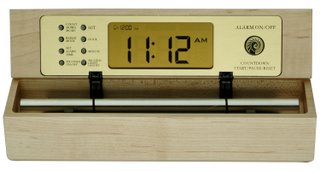 soothing chime alarms, a great tool for napping About the Author
Cathleen Schine is the author of eight novels, including The New Yorkers, The Love Letter, Rameau’s Niece, and, most recently, The Three Weissmanns of Westport. She lives in New York City and Venice, California.
 chime alarm clock store, Boulder, Colorado Now & Zen Chime Alarm Headquarter Store
1638 Pearl Street
Boulder, CO 80302
(800) 779-6383
Posted in Bamboo Chime Clocks, Now & Zen Alarm Clocks, Progressive Awakening, sleep, Sleep Habits
 it's okay to yawn Afraid to risk rudeness and let out a hearty yawn? Well, here’s an excuse to give Miss Manners a hissy fit: According to neuroscientist Andrew Newberg, MD, director of the Center for Spirituality and the Mind at the University of Pennsylvania, yawning is one of the best-kept health secrets. “If you want to maintain an optimum healthy brain, it is essential that you yawn,” says Newberg. The action stimulates neural movement in certain areas of the mind and regulates brain temperature and metabolism—all of which can increase muscle control, enhance sensuality, and even ward off jet lag. Newberg suggests yawning 10 times in a row every day, along with your regular workout or wellness routine. A nightly yawning ritual can help you:
Chill out. Newberg says a good yawn can relax you more effectively than meditation. “More than simply calming the body, yawning brings the mind into a heightened state of cognitive functioning.”
Stay focused. “Yawning rids the brain of sleepiness, helping you keep your attention on important ideas and concepts,” says Newberg. So why do we start yawning before we hit the sack? Because it also helps regulate our internal clock: When we’re tired, yawning signals sleep. No need to set your Zen Alarm Clock for bedtime quite yet.
Be more compassionate. Studies show yawning stimulates the part of the brain responsible for generating empathy and social awareness. So intentional yawning may actually strengthen our ability to be kind to others.
adapted from Natural Solutions Magazine, October 2009 by Danielle Winston
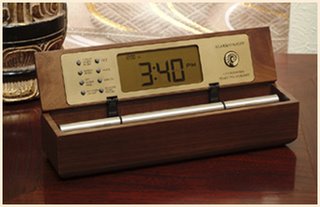 Digital Zen Alarm Clock Now & Zen
1638 Pearl Street
Boulder, CO 80302
(800) 779-6383
Posted in Beauty, intention, Natural Awakening, Now & Zen Alarm Clocks, Sleep Habits, Well-being
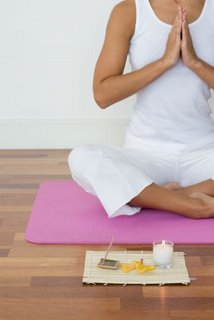 Take a Moment for Yourself When You Need a Moment…
Try a Sitting Meditation
To recenter your mind and body, sit on the floor in a comfortable position with a straight back. Set Your Zen Timepiece to repeat every 10 seconds. Inhale for ten seconds, then smoothly exhale for ten more. Repeat for at least three minutes and increase to 20 minutes as you improve.
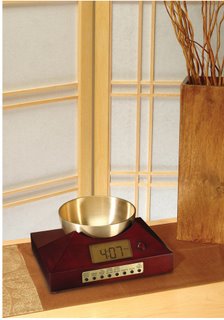 Set Your Singing Bowl Alarm to Repeat Every 10 Seconds
Posted in Bamboo Chime Clocks, Zen Timepiece by Now & Zen, Zen Timers
 time your walking meditation with the Digital Zen Timer by Now & Zen, Inc. Ways to Relive Stress:
Get rid of nervous tension by inhaling as you take four steps, then exhaling for four steps. Repeat for at least three minutes (the longer, the better). Work up to six to eight steps per inhale and exhale. Use your Digital Zen Timer on the ‘Repeat Mode’ so that it will chime every three minutes to time yourself.
Now & Zen Headquarter Store
1638 Pearl Street
Boulder, CO 80302
 Timers and Alarms with Chimes
Posted in Chime Alarm Clocks, Meditation Timers, Meditation Tools, mindfulness practice, nature, Now & Zen Alarm Clocks, Yoga Timer, Zen Alarm Clock
 Choki Eishosai, Sunrise at New Year It turns out that toddlers are not the only ones who do better after an afternoon nap. New research has found that young adults who slept for 90 minutes after lunch raised their overall learning power, their memory apparently primed to absorb new facts.
Other studies have indicated that sleep helps consolidate memories after cramming, but the new study suggests that sleep can actually restore the ability to learn.
The findings, which have not yet been published, were presented Sunday at the annual meeting of the American Association for the Advancement of Science in San Diego.
“You need to sleep before learning, to prepare your brain, like a dry sponge, to absorb new information,” said the lead investigator, Matthew P. Walker, an assistant professor of psychology and neuroscience at the University of California, Berkeley.
The study recruited 39 healthy young adults and divided them into two groups. All 39 were asked to learn 100 names and faces at noon, and then to learn a different set of names and faces at 6 p.m. But 20 of the volunteers who slept for 90 minutes between the two overall learning sessions improved their scores by 10 percent on average after sleeping; the scores of those who didn’t nap actually dropped by 10 percent.
Set your Zen Alarm Clock in your office and take a little snooze so that you can prime your brain for the best overall learning experience.
adapted from The New York Times, February 2010 by Roni Caryn Rabin
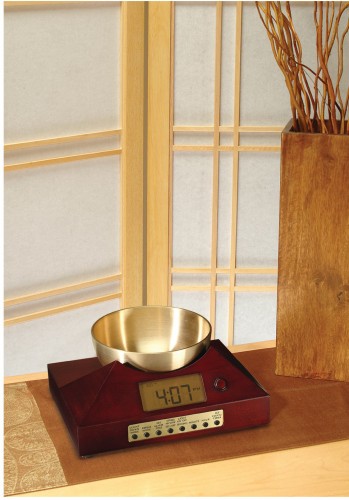 Zen Timepiece, an alarm clock to wake one from napping with Tibetan bowl/gong Now & Zen
1638 Pearl Street
Boulder, CO 80302
Posted in Bamboo Chime Clocks, Chime Alarm Clocks, Japanese Inspired Zen Clocks, Natural Awakening, Now & Zen Alarm Clocks, Progressive Awakening, Sleep Habits, Well-being
 Dream Recall
The Digital Zen Alarm Clock can help you remember and use your dreams in two basic ways: First, by not abruptly interrupting your dreams and allowing your dreaming mind to “finish the dream;” and secondly, by giving you the time between chimes to lie in bed undisturbed when you are first awakened, so you can recall your dreams. Depending on how deeply you are sleeping when the clock’s alarm is triggered, it may take several chimes of the Digital Zen Alarm Clock to arouse you from a dreaming state, or you may be awakened by the first chime. But even if the first chime does wake you, it is possible to resume or re-enter a dream from which you are marginally awakened if you are allowed to return to the dream without further disturbance. The interval between the first and second chimes can provide a period of time for you to reach a cathartic conclusion to your dream. Preventing the abrupt interruption of your dreams acts to preserve your dream experiences, and maximizes the psychic benefits to be derived from improved memory of your dreams.
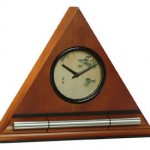 Zen Clocks by Now & Zen There is general agreement among dream researchers that “natural” awakening (as opposed to using a clock radio or buzzer alarm) aids in dream retention and understanding. The Digital Zen Alarm Clock comes closer to providing a natural awakening than practically any other wake-up aid. For best results, as you are falling asleep at night, resolve that your first thought upon waking will be the recollection of your dream. Whether or not you are in the middle of a dream when the chime wakes you, your best dream memories will be available in your first moments of waking consciousness.
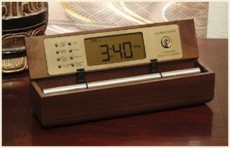 Digital Zen Alarm Clock
Before opening your eyes or moving, lie quietly and try to remember your dream. Recall the sequence of events and the most vivid images. When you have a conscious memory of your dream, you are ready to open your eyes and get up. Keeping a notebook by your bed to write down your dream memories can also be helpful. Discovering the value of your dream life can be richly rewarding.
Posted in Natural Awakening, Now & Zen Alarm Clocks, Progressive Awakening, Zen Clocks and Dream Recall
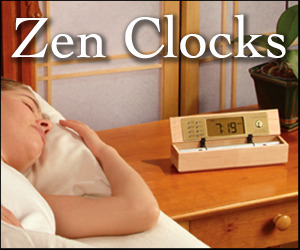 Chime Alarms for a Peaceful Awakening A truly energized, productive day is possible only after a relaxed, restorative night. “Your alertness during the day is dependent on the quality of your sleep and on getting undisturbed sleep,” says Thomas Roth, Ph.D., a psychologist and the director of the Sleep Disorder Center at Henry Ford Hospital, in Detroit. Research has shown that seven to eight hours really is the ideal. Start preparing yourself about an hour before bed, advises Michael Perlis, Ph.D., an associate professor of psychology and the director of the Behavioral Sleep Medicine Program at the University of Pennsylvania. “You need to allow yourself to decompress and unwind,” he says. Physically and psychologically, you’ll be better prepared for quality sleep. Remember to set your Chime Alarm that will gradually awaken you with a series of gentle chimes in the morning, so that you are not startled awake!
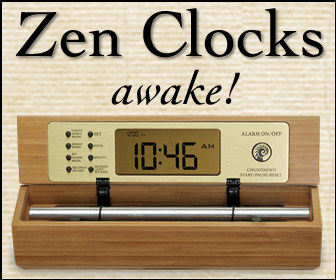 When the clock’s alarm is triggered, the acoustic chime bar is struck just once ... 3-1/2 minutes later it strikes again ... chime strikes become more frequent over 10 minutes ... eventually striking every 5 seconds until shut off. Now & Zen’s Shop – The Zen Alarm Clock Store
1638 Pearl Street
Boulder, CO 80302
(800) 779-6383
Posted in Sleep Habits, Well-being
 set your alarm to signal your body it's time to sleep Evening Ritual:
Use an evening alarm. “Set the Chime Alarm from Now & Zen, Inc. to remind you when it’s time to get ready for bed,” says Rubin Naiman, Ph.D., an assistant professor of medicine at the Arizona Center for Integrative Medicine, in Tucson, and the author of The Yoga of Sleep ($20, amazon.com). When the alarm sounds, start turning lights off around the house to let your body know it’s almost time to call it a night.
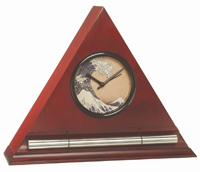 Soothing Chime Clock can be Used As a Evening Ritual Now & Zen Headquarter Store
1638 Pearl Street
Boulder, CO 80302
(800) 779-6383
Posted in Bamboo Chime Clocks, sleep, Sleep Habits
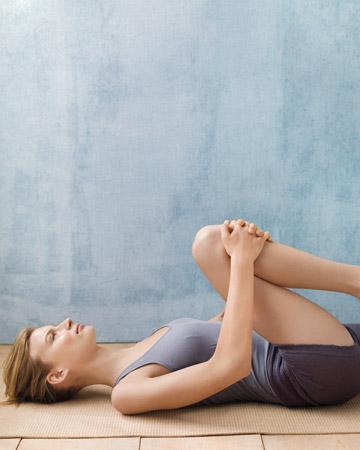 Time your exercise each day and sleep better An early-evening workout may help you sleep. A study from Northwestern University, in Chicago, showed that insomniacs who did about 40 minutes of moderate cardio between 1 p.m. and 7 p.m. four times a week got an average of 75 more minutes of sleep a night. Set your Digital Zen Clock/Timer for at least 20 minutes. Choose an easy routine and finish two hours before bed, says Kori Malyszek, a coordinator for the Equinox Fitness Training Institute, in Los Angeles.
adapted from RealSimple.com
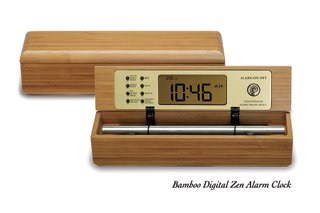 Bamboo Digital Zen Timer and Alarm Clock Now & Zen
1638 Pearl Street
Boulder, CO 80302
(800) 779-6383
Posted in Bamboo Chime Clocks, mindfulness practice, Now & Zen Alarm Clocks, Well-being
 Stretch and do Yoga with Your Chime Timer to Create a Wake Up routine in the Morning These energy-boosting changes to your daily routine will leave you feeling recharged.
Time to Wake Up!
Even if you’re a morning person, you’re probably far from firing on all cylinders when you first open your eyes. “It can take up to two hours to get the brain fully alert,” says Matthew Edlund, M.D., the director of the Gulf Coast Sleep Institute, in Sarasota, Florida, and the author ofThe Power of Rest: Why Sleep Alone Is Not Enough ($26, amazon.com). One reason you’re lethargic is that your core body temperature has dipped during the night to keep you in deep, restorative slumber. Try these morning energy strategies to get going with a lot less grief.
Let in the sun and stretch. Exposure to light stimulates your brain to stop producing melatonin (the hormone that helps induce sleepiness), says Edlund. Light also gets your body out of sleep mode by resetting the brain’s suprachiasmatic nucleus (a big name for a region about the size of a grain of rice), which controls the body’s circadian rhythms (or 24-hour biological clock). Meanwhile, Edlund says, “the first physical activity of the day raises the body temperature and increases blood flow to your brain.” Open the blinds, then try some stretches in front of the window. (If neighbors live in close range, make sure your pj’s are presentable.) Use your Zen Timepiece by setting it to count down in 20 minutes while you gently stretch and do a few yoga poses.
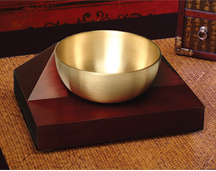 Chime Timer by Now & Zen with Tibetan-Singing Bowl Gong Get moving. A morning workout triggers feel-good endorphins and lowers elevated stress hormones. The effects can last six to eight hours, says Gregory Florez, a spokesperson for the American Council on Exercise, in Salt Lake City: “Morning exercisers tend not to have midmorning slumps and are sharper mentally than if they hadn’t exercised.” You’ll get the most bang for your energy buck, he says, with a workout that includes both cardio and strength training.
Look at something you love. Mornings are especially hard because we’re in survival mode, says Jim Loehr, Ed.D., a cofounder of the Human Performance Institute, in Orlando, Florida. We have to meet basic needs, like hunger and thirst, and to the body that feels as if we’re under threat, which saps our energy. Positive emotions, like hope and gratitude, fight that energy drain by counteracting the primal messages that we’re in some kind of danger. Loehr suggests kick-starting those positive emotions by looking at something meaningful: Next to your bed, place a treasured photo, flowers, or anything else you’re grateful to see.
Shake up your routine. The brain responds to novel experiences by releasing a rush of neurotransmitters, such as dopamine, which make you more alert. No need for a morning cliff dive—just take something ordinary and switch it up: If you’re right-handed, use your left hand to brush your teeth.
By Amy Paturel and Sara Reistad-Long from RealSimple.com
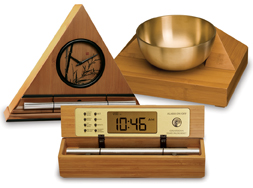 Chime Timers and Clocks for A Gradual Awakening Now & Zen Headquarter Store
1638 Pearl Street
Boulder, CO 80302
(800) 779-6383
Posted in Chime Alarm Clocks, Now & Zen Alarm Clocks, wake up alarm clock, Well-being, Yoga Timer, Yoga Timers by Now & Zen
« Previous Page — « Previous Entries
Next Entries » — Next Page »
|
|
|
|